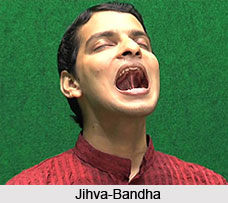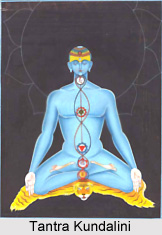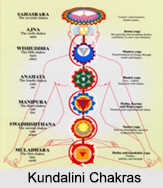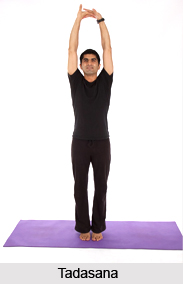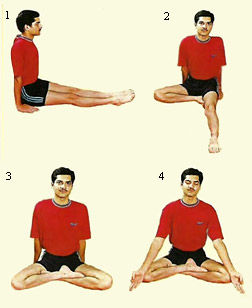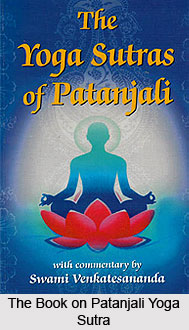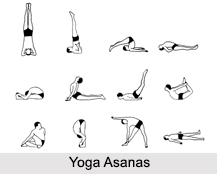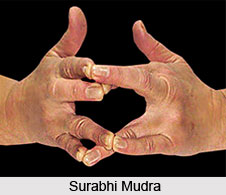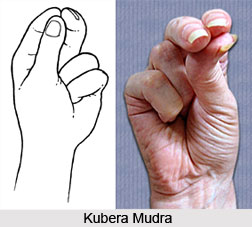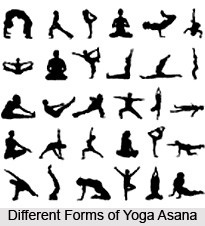 The fifty-third yoga sutra states about the significance of momentary time and time spent in moments. By samyama, focussing on one thing alone, a sadhaka can attain samadhi. A moment in time is always eternal, and movement is generally under the constraints of time and short-living, whereas, moment is perpetual, unchanging and sanctified. Herein, lies the secret of samadhi. Moment is unconditioned reality, while the sequence of moments is conditioned reality. Moment and movement is always sharply contrasted, and when a sadhaka has understood the reality of this phenomena, he has achieved `exalted intelligence`. In such a condition, a yogi is released from the constraints of time and space. However, this moment, free of time, must be needs to be prolonged, stretched and expanded to attain the state of kaivalya.
The fifty-third yoga sutra states about the significance of momentary time and time spent in moments. By samyama, focussing on one thing alone, a sadhaka can attain samadhi. A moment in time is always eternal, and movement is generally under the constraints of time and short-living, whereas, moment is perpetual, unchanging and sanctified. Herein, lies the secret of samadhi. Moment is unconditioned reality, while the sequence of moments is conditioned reality. Moment and movement is always sharply contrasted, and when a sadhaka has understood the reality of this phenomena, he has achieved `exalted intelligence`. In such a condition, a yogi is released from the constraints of time and space. However, this moment, free of time, must be needs to be prolonged, stretched and expanded to attain the state of kaivalya.
ksana an instant, a moment, an infinitesimal unit in time
tat that, its
kramayoh order, sequence, succession
samyamat by constraint
vtvekajam exalted intelligence, total awareness
jnanam knowledge, sacred knowledge, cognisance
By samyama on moment and on the continuous flow of moments, the yogi gains exhilarated knowledge, free from the limitations of time and space.
Patanjali now shows an altogether different method of reaching samadhi - by samyama on the continuous flow of moments which move in a succession known as time, the yogi gets direct understanding of time and relativity. From this, he recognises that a moment in time is timeless, and that this timelessness is real and eternal, whereas its movement is restrained to the past and the future. Movement is timebound, transitory and ever-changing. The moment is everlasting, changeless, sacred - it is, in fact, the secret of samadhi. The moment is unconditioned reality, while the sequence of moments is conditioned reality; it is relative to the absolute and illusory. This realisation is termed `exalted intelligence`.
In moment, neither psychological nor chronological time is felt. Moment comes between rising impressions and their restraints and vice-versa - it is a quiet intervening state, auspicious and pure, and is to be stabilised, prolonged and expanded, so that consciousness becomes absolute.
This is vivekajajnana- the gateway to kaivalya. The yogi has learned the orderly sequence of practice and of time, and now cannot be ensnared by the enticements of celestial beings. (But, should this happen, he is reminded to pursue his sadhana, and to keep Self-Realisation as his goal).
As atom is the minutest particle of matter, similarly, moment is the minutest particle of time. The moment is singularly alone. Moments succeed one another in sequence, and these sequences put together constitute time. Thus the spokes of moments move into the wheel of time. The movement of mind in a continuum is psychological time. The movement of moments in present, past and future is chronological time.
The yogi is always aware of the moment and thus conquers psychological and chronological time. He remains attentive to the moment, and does not allow his attention to slip into the movement of moments. He remains undisturbed, and with the loss of the time factor, his consciousness, too, loses its implication. Then, he catches sight of the soul. This is vivekaja jnana, exalted intelligence - the secret and sacred knowledge.
This sounds extremely complicated, and certainly its absolute realisation is unbelievably difficult, like trying to thread a needle when the thread is thicker than the needle`s eye. Yet there is a seed lesson here from which everyone can learn, and improve the quality of their lives.
Poets and wise men, since the beginning of the written word have enjoined humans in all cultures to live in the present moment because it is all that one really has. Questions like - has one ever wondered, while watching nature films on television, which herds of beautiful gazelles are constantly surrounded by marauding predators, why their life is not a living hell of fear and insecurity? How can they live their family lives of courtship, procreation, joy in their own physical perfection, knowing that the inevitable end will be in the lion`s jaws, are bound to arise. One cannot say it is dull fatalism, or lack of imagination. If they lacked imagination why would they run away so fast? The answer must be that they have the capacity to live in the present moment as it is and not as it might be. Those who live in reality, which can only be the present, will die without a doubt, but will have lived before they die. Many people die without having lived. This is true cellularly as well as psychologically. By perfect positioning in asana, one floods his or her cells with life, which is nothing but present awareness. The cells too will die - but first they will have lived.
A teacher of asana, needs always to be intense and harsh with the students, so that one and a half hours of present life in a lesson rigorously can be imparted. For those who habitually flee the present, one hour`s experience of `now` can be intimidating, even exhausting. Human`s perpetual mental absences are like tranquillising drugs, and the habit dies hard. For a nifty student, the effect of asana is exhilarating.
The `elsewhere` or `otherwise` mentality, to which one is bound by psychological time, compels one to emasculate the present reality with the illusory unreality. It is as if one was staying in a town with only one hotel, not a very nice one, and all night one is miserable because he or she is thinking of the lovely hotel one had stayed in the night before. But as the town has only one hotel, one is destroying the night`s sleep for the sake of fantasy. Now the atom of the moment, the minutest particle of time, is like the town with only one hotel. If one can live with that, such as it is - good, bad or indifferent, without a forwards, backwards or sideways glance, then one is free.



